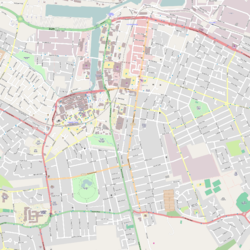| St Mary's Church | |
|---|---|
| St Mary on the Sea Church | |
 | |
| 53°34′04″N0°04′15″W / 53.5678°N 0.0707°W | |
| OS grid reference | SK 97840 71388 |
| Location | Grimsby |
| Country | England |
| Denomination | Roman Catholic |
| Website | |
| History | |
| Status | Active |
| Dedication | Our Lady, Star of the Sea |
| Architecture | |
| Functional status | Parish church |
| Heritage designation | Grade II listed |
| Designated | 30 June 1999 [1] |
| Architect | Matthew Ellison Hadfield |
| Style | Gothic Revival |
| Groundbreaking | 1880 |
| Completed | 19 August 1883 |
| Administration | |
| Province | Westminster |
| Diocese | Nottingham |
| Deanery | Grimsby [2] |
| Parish | The Most Holy and Undivided Trinity, Grimsby, Cleethorpes and Immingham |
St Mary's Church or its full name St Mary on the Sea Church is a Roman Catholic Parish Church in Grimsby, Lincolnshire. It was built from 1880 to 1883. It is situated on the corner of Heneage Road and Wellington Street in the town centre. It was designed by Hadfield and Son and is a Grade II listed building. [1]

